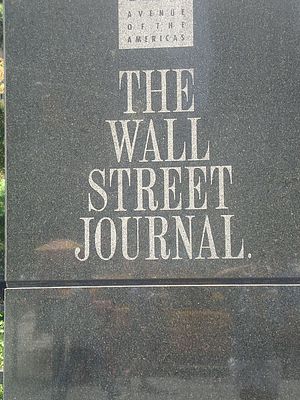After a failed attempt to purchase The New York Times, a Chinese millionaire has set his sights on the Wall Street Journal. Chen Guangbiao, the wealthy owner of Jiangsu Huangpu Recycling Resources, told the Global Times on Wednesday that he is interested in purchasing the WSJ as well as an unnamed U.S. news website. According to an estimate quoted by the Global Times, Chen’s net worth was around $826 million in 2013, requiring him to seek partners to make good on his offer to purchase the Times for $1 billion. He hasn’t yet stated how much he would offer for the WSJ.
Another article in the Global Times noted that Chen’s dream is all but impossible, as the owners of the New York Times are not interested in selling the paper. Still, the article speculated that, given the tough environment for print media, “it might not be too much [of] a surprise if one day some or all of the controlling stakes are put up for sale.” The article went on to point out that Chinese “have gone on a shopping spree of overseas acquisition over the years,” implying there’s no reason U.S. media outlets couldn’t be part of this trend as well.
So why does Chen want to buy American media outlets? “The US has media with global influence. I want to buy some of these outlets to deliver positive ideas including peace, environmental protection and charity,” Chen told the Global Times. In an earlier comment, he was more specific about what “positive ideas” he wanted to promote — Chen specifically mentioned making sure the Times had “objective coverage” of China. In an op-ed explaining his desire to buy the paper, Chen said he first had the idea when he found it necessary to place an advertisement in the paper in 2012 claiming China’s sovereignty over the Diaoyu Islands. “I find Americans know little about a civilized and open China that has been enjoying unprecedented development,” Chen wrote. “If we could purchase [the Times], its tone might turn around.” Chen claimed that his ultimate goal was “to make the paper’s reports more authentic and objective, thus rebuilding its credibility and influence.” Presumably his new goal of purchasing WSJ is motivated by the same reasons.
Not everyone in China approves of Chen’s move. Renmin University journalism professor Chen Lidan called the millionaire’s action “a ridiculous stunt.” Chen is in fact well-known in China for pulling stunts, from selling cans of “fresh air” during a period of heavy smog in Beijing to giving away cash on the streets. And, serious or not, there have certainly been hilarious gaffes in his quest to buy a U.S. media outlet (including his boast that he would get along well in the media world because “I am very good at working with Jews”). Tea Leaf Nation pointed out that Chen doesn’t even have much support within China, where media outlets call him “naïve and immature” and netizens deride him as a “clown.”
Given this background, why did so many U.S. news outlets pick up on the story? For one thing, Chen knows how to attract attention, and a story about a Chinese businessman buying one of the most famous papers in the world is certainly intriguing. However, the story also comes at a sensitive time for the U.S. in general and the media world in particular. Recently, there have been several high-profile stories about Chinese companies buying U.S. landmarks, from One Chase Manhattan Plaza in New York City to the naming rights to Grauman’s Chinese Theatre in Hollywood (now known as TCL Chinese Theatre). At the same time, U.S. newspapers face an uncertain status in a digital world. Due to declining profits, the Graham family, after controlling the paper for 80 years, decided to sell The Washington Post to Amazon founder Jeff Bezos. Add the trend of floundering media companies being bought out to the trend of Chinese entrepreneurs investing in U.S. assets, and voila — you get the potential for an existential crisis among U.S. media outlets.
Though Chen’s efforts are unlikely to get anywhere, it does raise interesting questions about how the U.S. and Chinese media systems might combine. It seems that Chen was interested in turning the New York Times or the Wall Street Journal into the next China Daily, a state-run newspaper that promises to provide “the Chinese perspective” on issues. But this of course begs the question of what the role could be for a nominally American paper that presents the Chinese perspective. Would the Times’ Chinese language website be removed from China’s censorship list? Would U.S. journalists be required to pass the new ideological exam that Chinese journalists must take? Would the U.S. public accept a Chinese-owned New York Times or Wall Street Journal, considering the outrage against Bloomberg when its editors were accused of kowtowing to China?
To put it mildly, the U.S. vision of a free press does not mix well with the Chinese vision of a press that exists to serve the Communist Party. Imagining Chen Guangbiao in charge of the New York Times is as strange as imagining Jeff Bezos in charge of People’s Daily, bringing along his stated vision about “the importance of investigative journalism” and “reporting stories that government officials might seek to suppress.” Media conglomerates represent one facet of the business world where the Chinese and American systems remain completely incompatible, in their goals, business strategies, and structure. If nothing else, Chen’s story served to remind us of this.

































